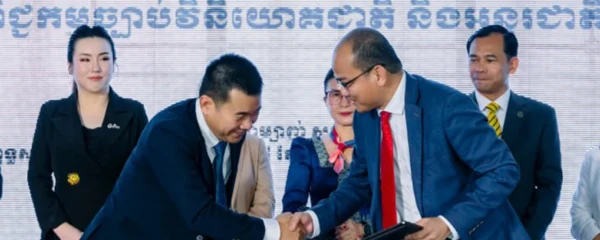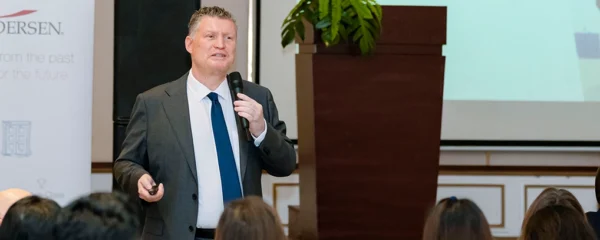Law Digest 2025
April
Taxation
Prakas No. 192 dated March 12, 2025 issued by the Ministry of Economy and Finance on the “Rules and Procedures for Implementing Trust Taxation”
The Prakas provides significant guidance on the legal and tax treatment of trusts in Cambodia.
Types of trusts
The Prakas provides clarification on several types of trusts that are specified under the Law on Trusts:
- Public trusts: Established for the benefit of the public, these include development funds and social welfare initiatives.
- Commercial trusts: Operated for profit, these encompass structures like pension funds, education funds, and investment vehicles.
- Social trusts: These are funded by settlor donations for charitable, cultural, educational, religious, or scientific purposes.
- Individual trusts: These are created for the personal or specific interests of the designated beneficiaries.
Tax registration requirements
Trustees are subject to specific tax registration obligations as follows:
- A trustee that is a legal entity must register as a medium or large taxpayer.
- Independent physical trustees may register as small, medium, or large taxpayers based on their turnover or fixed assets, in accordance with the Prakas on Taxpayer Classification.
- The registration process must be initiated within 15 working days from the commencement of economic activities or upon obtaining approval from the Trust Regulator.
Accounting requirements for trustees
Trustees are required to maintain proper accounting records as follows:
- Accounting records for their own operations must be kept from those of the trust to ensure clear tracking of the trust’s property ownership, income, expenses, liabilities, and other transactions.
- All accounting practices must comply with the rules prescribed under the Law on Taxation.
- When managing multiple trusts, separate accounting records must be maintained for each trust.
Tax implications for trustees and trusts
Taxation for trustees
Trustees are subject to tax on any income earned from managing trust operations. Legal entity trustees are subject to 20% Tax on Income, while individual trustees, including sole proprietorships and partnerships, are subject to progressive rates ranging from 0% to 20%.
Transfers of property or funds by the settlor or trustor to a trustee for management, administration, or maintenance per the terms specified in the trust deed or applicable laws are not considered the income or property of the trustee.
Taxation for trusts
Trust property may be subject to various taxes depending on the nature of transactions:
- Immovable property rental tax: Applies to rental income generated from trust-owned immovable property. If a property is rented out, tax at a rate of 10% applies on the gross rental income. The trustee must calculate the tax, file a declaration, and remit payment to the General Department of Taxation.
- Capital gains tax: Levied on income from the sale or transfer of trust assets. The trustee must record this income, calculate the tax amount, file a declaration, and pay the tax according to the regulations in force.
- Registration tax: Applicable when transferring ownership or possession rights of trust property (movable or immovable), including land and buildings.
- Withholding tax: When distributing after-tax income to non-resident beneficiaries, this tax applies unless capital gains tax has already been paid on that income. The trustee must record these transactions in the trust’s accounting records, calculate the withholding tax, submit a declaration, and remit payment as required.
Existing tax exemption provisions remain applicable to trust property, provided the relevant eligibility criteria under the tax laws are met.
Notification No. 004 dated April 23, 2025 issued by the Ministry of Economy and Finance on “Additional Incentives for Property Taxes for Stalled Building Projects in Preah Sihanouk Province”
As part of its “Special Program to Promote Investment in Sihanoukville Province 2024” (“Special Program”), the Royal Government of Cambodia announced the extension of property tax exemptions for stalled building projects in Sihanoukville Province that began construction in 2016. The exemptions are granted for an additional three years—until the end of 2028—regardless of whether construction is completed in 2025. This applies to all stalled construction projects in Sihanoukville Province, irrespective of whether they fall within the scope of the Special Program.
Of note is that this property tax exemption does not apply retroactively to any taxes or administrative penalties that have already been paid.
In addition, for projects that have not yet received any incentives, including tax incentives under the Special Program, project owners may apply to the Preah Sihanouk Province Investment Promotion Working Group to receive additional incentives beyond the property tax exemption.
Advertising
Letter No. 695 dated April 24, 2025 issued by the Office of the Council of Ministers addressing “Prohibitions on Marketing Practices involving Promotional Prize Schemes through Bottle Caps and Cans in the Beverage and Alcohol Industry”
Pursuant to the joint request submitted on March 18, 2025 by Heineken, four other beverage and alcohol companies, and the Wine Spirits Beer Importers and Distributors Association, the Royal Government of Cambodia has agreed in principle to address marketing practices involving promotional prize schemes through bottle caps and cans in the beverage and alcohol industry.
The agreement covers the following key points:
Transition period for compliance
If a regulatory prohibition is imposed against promotional prize schemes through the lids or caps of alcoholic and other beverage products, there must be a reasonable transitional period for companies to prepare. Accordingly, affected companies will be granted a preparatory period suggested to be no less than six months and up to one year to allow them sufficient time to make adjustments.
Consultative meeting
A formal consultative meeting will be convened between the manufacturers and the relevant ministries and institutions. It will be chaired by His Excellency Prime Minister Hun Manet, with an aim to determine an appropriate timeframe as well as procedural framework for the nationwide prohibition against prize-based marketing strategies in this sector.
Relevant advertising restrictions
The regulatory prohibition that initiated this discussion refers to the provisions outlined in Prakas No. 95 on Unfair Practices in Business Related to Advertising and Sales Promotions issued by the Ministry of Commerce on April 12, 2024. In particular, Article 13 of the Prakas prohibits the use of misleading advertising and promotional practices, including but not limited to:
- The use of unverifiable claims such as “the best,” “only one,” “number one,” “superior” or “unrivaled,” that are unsubstantiated by any valid certification from relevant ministries, institutions, and competent authorities.
- The use of promotional phrases such as “pop open and win,” “scratch and win,” “buy and win,” “pop more win more,” “buy one get one free,” “buy more win more,” or similar wording that implies undefined or unspecified rewards, which may mislead consumers as to the nature of the products or services offered.
Violation of the rules outlined in Prakas No. 95 may lead to a fine of up to KHR50 million. If the breach involves false or misleading advertising under Article 13, the fine may be as high as KHR80 million.
Customs
Sub-Decree No. 59 dated April 10, 2025 issued by the Royal Government of Cambodia on the “National Single Window System”
This Sub-Decree outlines the regulation and operation of Cambodia’s National Single Windows System (“NSW System”), a centralized online platform designed to improve the efficiency of export, import, and transit procedures by enabling the electronic submission and processing of trade-related documents.
The NSW System is used to apply for and issue licenses, permits, certificates, and other authorizations for goods, including:
- Prohibited or restricted items
- Goods under free trade agreements and international treaties
- Petroleum products and duty-free shop items
- Goods of ministries, institutions, diplomatic missions, foreign consulates, and national/international organizations that are exempt from taxes and duties
The system is managed by the National Single Window Project Steering Committee and operated through the official website: https://nsw.gov.kh. All relevant ministries and institutions are required to issue authorizations through the system and collaborate electronically to exchange trade-related data.
Key users of the system
- Government officials
- Exporters/importers
- Customs brokers
- Authorized organizations and individuals
To access the NSW System, users must register through procedures set by the National Single Window Project Implementation Team; they are required to maintain data confidentiality and security at all times.
The NSW System is integrated with domestic and international electronic systems, including the ASEAN Single Window, to enable cross-border data exchange.
Operational guidelines
- Only the owner of the goods or its authorized representative may apply.
- Ministries must process applications within three working days, unless technical issues arise.
- Temporary offline procedures may be allowed during system disruptions, with proper notification.
Fees and payments
- Public service fees must follow existing regulations.
- All payments must be made electronically unless an exception applies.
This Sub-Decree is effective from April 10, 2025. Existing laws remain in effect until updated, but all conflicting regulations are void.
March
Commerce
Announcement dated March 18, 2025 issued by Ministry of Commerce on the “Official Launch of the Secured Transactions Filing System 2.0 (SETFO 2.0)”
SETFO, originally introduced in 2008, is an automated system that helps banks, microfinance institutions, and the public manage records relating to all notice letters filed in relation to secured transactions, serving as a foundation for decision-making as well as risk and damage mitigation, especially for loans using movable property as collateral. The updated SETFO 2.0 system aims to make it easier for small businesses and farmers to access credit using their assets.
Key new features of SETFO 2.0 include:
- Improved security and ease of use
- Registration and access via the CamDigiKey mobile app
- Full online payment capabilities
- Capabilities to make online requests and download validated and verified research reports via verify.gov.kh
- Improved accuracy of notices through blockchain-based technology (Cambodia Digital Ledger – CamDL)
More details on how to use SETFO can be obtained by contacting the Secured Transactions Filing Office team at the Ministry of Commerce via the websites www.setfo.moc.gov.kh and www.setfo.gov.kh, telephone number 089 510 600, hotline: 1266, or email at setfo@moc.gov.kh.
Public
Royal Decree No. 0325/001 dated March 1, 2025 issued by the National Assembly of Cambodia “Against the Non-Recognition of Crimes Committed During the Democratic Kampuchea Regime”
This decree establishes legal consequences for individuals or entities that publicly deny, undermine, or object to the recognition of crimes committed during the Democratic Kampuchea regime (commonly known as the Pol Pot or Khmer Rouge regime). These crimes have been formally recognized by the Extraordinary Chambers in the Courts of Cambodia (“ECCC”), which was created to prosecute individuals responsible for serious offenses committed between April 17, 1975 and January 6, 1979, including genocide, crimes against humanity, and violations of the Geneva Conventions.
Key provisions of the decree:
1. Public non-recognition
An individual or legal entity will be considered in violation if they publicly engage in one or more of the following:
- Utterance of words or gestures in public that deny or undermine the crimes.
- Distribution or display of letters or drawings that deny the crimes.
- Dissemination of such denials or undermining information via social media or telecommunications platforms, including audiovisual means.
2. Penalties
Individuals found guilty of public non-recognition will face the following penalties:
- Imprisonment of from one to five years; and
- Fines ranging from KHR10 million to KHR50 million.
3. Additional penalties
In addition to imprisonment and fines, the following penalties may also apply under the Criminal Code of Cambodia:
- Loss of certain civil rights.
- Prohibition from specific professions related to the offense.
- Publication of the sentencing decision in media outlets (press, all forms of telecommunications, and audiovisual means).
4. Liability of legal entities
Legal entities found guilty of non-recognition of the crimes may face criminal liability under the Criminal Code of Cambodia. They can be fined between KHR50 million and KHR500 million, in addition to other penalties outlined in Article 168 of the Criminal Code.
5. Transitional provisions
- This new decree replaces all prior laws prohibiting the non-recognition of crimes committed during the Democratic Kampuchea regime.
- For offenses committed before the decree’s enactment, earlier laws will still apply.
Employment
Prakas No. 73 dated March 4, 2025 issued by the Ministry of Labor and Vocational Training (“MLVT”) on the “Procedure for Resolving Individual Labor Disputes”
The MLVT has introduced new procedures for resolving individual labor disputes, which aim to streamline dispute resolution while imposing penalties for non-compliance, ensuring a fairer and faster process for both employees and employers. Key provisions include:
- Complaint filing: Employees and employers can file complaints with the labor inspector for mediation. Complaints can be submitted to the Department of Labor Disputes or the Department of Labor and Vocational Training at the capital or provincial levels.
- Labor inspector’s role: Once a complaint is received, the labor inspector reviews it and decides whether to initiate mediation or conduct a labor inspection. Mediation is the first step toward resolving the issue.
- Mediation process: The labor inspector reviews the case and collects the necessary information from each party separately. Once all relevant information is gathered, a joint mediation session will be scheduled, and failure to attend may lead to:
-
- Dismissal of the complaint: If the complainant fails to attend meetings or provide requested information without a valid reason, the complaint may be dismissed.
- Admission of the complaint: If the defendant fails to appear, the absence is treated as an admission of the complaint.
- Dismissals: Complaints that are dismissed due to non-compliance (e.g. failure to attend mediation or provide documents) cannot be re-accepted if a new complaint is filed.
- Mediation documentation: At each mediation session, the labor inspector will record the minutes, which must indicate whether an agreement was reached. Both the labor inspector and the parties to the dispute must sign the minutes, and a copy will be provided to each party. Any agreement reached during mediation will be legally binding.
- Further action: If mediation fails, parties can:
-
- Request further mediation from the Minister of the MLVT (within 2 working days). Note that no further requests for mediation can be made after a second failure.
- File a complaint with competent labor authority within 2 months. If mediation is ongoing and a party submits a request for further action, the labor inspector will report the case to the Minister of the MLVT within 2 working days. The Minister of the MLVT will then refer the case to the Arbitration Council within three working days. Disputes dismissed by the labor inspector cannot be appealed to the Arbitration Council.
- This Prakas is effective from March 4, 2025, and supersedes Prakas No. 318 dated November 29, 2001, and any other conflicting provisions, which are now considered null and void.
Prakas No. 74 dated March 4, 2025 issued by the MLVT on the “Procedure for Resolving Collective Labor Disputes”
The MLVT has also introduced new procedures for resolving collective labor disputes. Below is a summary of key aspects of the new regulations:
- Complaint filing: Either the employer or the employees can file a complaint with the Department of Labor Disputes or the Department of Labor and Vocational Training to begin mediation, unless there is an existing agreement with specific dispute resolution rules.
- Labor inspector’s role: Once a complaint is received, the labor inspector reviews it and decides whether to initiate mediation or conduct a labor inspection. Mediation is the first step toward resolving the issue.
- Appointment of the mediator: The Minister of the MLVT must appoint a mediator within 48 hours, and mediation must begin within 15 days.
- Mediation process: The mediator collects the necessary information from both parties separately. Each time information is requested, a record must be made that is signed by the mediator, and signed or fingerprinted by the party providing the information (a copy of which is provided to the respective parties). Once all necessary information has been gathered, a joint mediation session is then held. During the mediation process, the parties must cease any further dispute actions.
-
- Mandatory participation: Both parties must attend or face penalties for absence without a valid reason (under Article 363 of the Labor Law).
- Cooperation requirement: If a complainant refuses to provide required documents or participate, the complaint is void. Complaints that are dismissed due to non-compliance cannot be re-accepted if a new complaint is filed.
- Legal effect of agreements: Any agreement reached and signed by the mediator is legally binding as a collective agreement between the parties involved and all other individuals who are represented by these parties. If the parties are not represented by a union, this agreement does not object against the union or the represented workers.
- Mediation failure:
- If mediation fails, the parties can request to reopen the process (within 2 working days), but no further requests can be made after a second failure.
- The mediator must make a report to the Minister of MLVT that mediation failed within 48 hours so the case can be referred to the arbitration council within three working days.
- Public safety cases: In cases affecting public safety, mediation will proceed immediately.
In cases where the labor dispute mediation fails to resolve the issue, the mediator must report to the Minister of the MLVT within 48 hours for further action to be taken by the Arbitration Council within 3 working days.
This Prakas is effective from March 4, 2025, and supersedes Prakas No. 317 dated November 29, 2001, and any other conflicting provisions, which are now considered null and void.
Taxation
Prakas No. 198 dated March 17, 2025 issued by the Ministry of Finance and Economy (“MEF”) on the “Reduction Withholding Tax for Domestic Airlines Companies”
In an effort to support the development of Cambodia’s aviation and tourism sector, the MEF issued Instruction No. 009 dated June 7, 2024 reducing the Withholding Tax (“WHT”) and Specific Tax (“SPT”) rates applicable to domestic airlines for a three-year period, June 1, 2024, until May 31, 2027, as follows:
- WHT rate: Reduced from 14% to 10% on aircraft lease payments made by domestic airlines to foreign companies.
- SPT rate: Reduced from 10% to 5% on air transport services provided to passengers, regardless of whether the service is operated by domestic or foreign airlines.
This Prakas further reduces the WHT burden on domestic airline companies for an extended period of four years, from the signing date until December 31, 2028.
Key updates:
- 2% WHT will apply to payments made by domestic airlines to non-resident taxpayers for the following categories:
- Aircraft rentals
- Maintenance and overhaul
- Overseas technical assistance
- Overseas airport charges
- IT shared services costs
- Brand licensing fees
- Online ticket booking system commissions
- Training by overseas vendors
- Centralized system shared costs
- System license fees
- 10% WHT will apply to payments for the following services:
- Management service fees
- Other services
Obligations:
To qualify for the tax relief, domestic airlines must comply with the following requirements:
- Tax filings: They must submit both monthly and annual tax returns through the General Department of Taxation’s e-filing system.
- Recordkeeping: They must maintain proper accounting records in accordance with Cambodian tax laws and regulations, ensuring that all business activities are properly documented.
February
Employment
Instruction No. 015/25 dated February 7, 2025 issued by the Ministry of Labor and Vocational Training on “Special Protection for Pregnant Female Employees”
This instruction aims to enhance working conditions for pregnant female employees, and safeguard their rights and well-being at the workplace both during and after pregnancy.
With regard to pregnant female employees, employers are:
- Prohibited from engaging in discrimination in relation to job opportunities, contract renewals, increases in wages and working benefits.
- Required to provide the wages the employee is entitled to before and during maternity leave.
- Prohibited from suspending the employment contract of the employee for a period of nine months following maternity leave, except where the suspension affects an entire department or all employees.
- Encouraged to automatically renew the employment contract of a female employee who is pregnant or is within one year of giving birth.
- Prohibited from terminating the employment contract of a female employee who is pregnant or is within one year of giving birth, except in cases of serious misconduct.
- Required to obtain the labor inspector’s prior review and approval before terminating the employment contract of female employee who is pregnant or is within one year of giving birth.
Employers that fail to comply with the above will liable under the applicable labor law and regulations.
Commerce
Notification No. 047 dated February 18, 2025 issued by the Ministry of Information on “Use of the National Domain Name .kh”
Sub-Decree No. 287 dated December 31, 2021 on the Management and Use of National Domain Names on the Internet requires that all legal entities registered in Cambodia to use the Cambodian domain name “.kh”. However, the Ministry of Information has found that there are still online businesses in the information and audiovisual sector using foreign domain names.
In order to establish an official online identity, enhance brand credibility, and improve searchability, the Ministry of Information has issued this notification to require that businesses to take the following actions:
- New businesses: All new online media businesses must register and use the Cambodian domain name ending with “.kh”.
- Existing businesses using foreign domain names: These businesses must transition to a Cambodian domain name ending with “.kh” by the end of 2025.
- Businesses that have a website permit but operate primarily on social media: These businesses must review and transition to a Cambodian domain name ending with “.kh” by the end of March 2025. Failure to do so will result in action being taken by the Ministry of Information.
Domain name registration can be completed through the National Domain Registration Service website at https://www.domain.gov.kh/.
Associations and NGOs
Notification No. 571 dated February 19, 2025 issued by the Ministry of Interior (“MOI”) on the “Fulfillment of Obligations Prescribed in the Law on Associations and Non-Profit Organizations”
This is the fourth notification issued by the MOI to urge associations and non-governmental organizations (“NGOs”) to comply with the following obligations as set out in the Law on Associations and Non-Profit Organizations:
- Notify the MOI and the Ministry of Economy and Finance (“MEF”) in writing of the details of their bank accounts used for their operations in Cambodia within 30 days of the date of registration. Already registered associations and NGOs who have not yet complied with this requirement have until the end of May 2025 to provide this information to the MOI and the MEF.
- For NGOs only, submit an annual summary report of work activities and an annual financial report to the MOI and the MEF no later than the end of February 2025. However, NGOs that receive financial support from donors must send the above reports with a copy of all the original documents sent to the donor within 30 days from the date of submission to the donor. Additionally, they must submit one copy of the project proposal, work plan, and financial agreement approved by the donor within 30 days from the date of approval. This report must be kept at the organization’s head office for a minimum of 5 years.
- Notify the MOI within 15 days from the date of any of the following changes, with all relevant updated documents attached: statute amendments, changes in headquarters, changes in leadership positions (such as the chairperson or executive director), or modifications to bank information.
Additionally, associations and NGOs are not permitted to engage in any activity that:
- Contradicts the statutes registered with the MOI, existing laws, or the regulations in force.
- Is aimed at generating profit for personal interest or to share financial gains.
May pose a threat to national security, the public order, the unity, culture, tradition, or social customs of Cambodia.
January
Real Estate
Announcement dated January 6, 2025 issued by the Ministry of Land Management, Urban Planning, and Construction (“MLMUPC”) on a “Trial Launch of Seven Additional Online Services”
Effective from January 7, 2025, the MLMUPC has announced the trial launch of additional online services to enhance the effectiveness and efficiency of public service delivery. The scope of the trial will cover only properties located in Phnom Penh. The new online services are as follows:
- Automated number registration
- Land consolidation
- Land division without transferring ownership
- Land division with exclusive sale
- Land division with exclusive gift
- Division of co-owned building strata title
- Division of ownership over a co-ownership property
These online services are available through the official MLMUPC portals at https://mlmupc.gov.kh/ or https://cadastral.mlmupc.gov.kh. Applicants will need to complete the required blank fields on the online application and upload the necessary supporting documents. Once all information is completed and preliminarily verified, applicants will then submit the final application through the online system for review by the MLMUPC.
Please note that as of now, there is no clear guideline as to whether the services can be done completely online or will require applicants to visit the authority’s office in person.
Labor
Press Release dated January 23, 2025 issued by the Ministry of Labor and Vocational Training (“MLVT”) on the “Official Launch of Mobile Public Service Counters”
The MLVT has announced the launch of its mobile public service counters, which offers 15 essential services by utilizing advanced technology. This initiative aims to provide fast, secure, and convenient access to crucial information and services, particularly for individuals seeking job opportunities both locally and abroad, while also helping to reduce instances of fraudulent recruitment practices.
The services can be accessed via mobile counters that the MLVT has installed in various convenient locations, such as cafes, shops, supermarkets, universities, and other public spaces. They are also available through a mobile app accessed via a QR code. The MLVT plans to expand its installation of mobile counters in April to enhance accessibility.
Some of the key services are as follows:
- For job seekers
- For employers
- For overseas job seekers
- Skills and TVET enrollment
- Social security registration
- Cambodian employment book and worker card
- MLVT public service tracking
- Anonymous complaint box
Recent Publications
Legal Release
Recent News

Edwin Vanderbruggen Featured in Cambodia Investment Review
Read More »
Andersen in Cambodia Signs MOU with Baray Global Management Co., Ltd
Read More »
Edwin Vanderbruggen, Senior Partner, Speaks at Eurocham Event on Trade and Tariffs
Read More »



